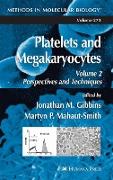- Start
- Platelets and Megakaryocytes
Platelets and Megakaryocytes
Angebote / Angebote:
Platelets are an essential element of the body's hemostasis system, and yet, through their involvement in thrombosis, are also a major cause of morbidity and mortality. Platelets have a limited lifespan and must be continually manufactured by their precursor, the megakaryocyte. In Platelets and Megakaryocytes, Volume 2: Perspectives and Techniques leading expert researchers-many responsible for seminal discoveries in the field-offer basic and advanced techniques for studying cell signaling in the regulation and function of platelets and megakaryocytes, as well as state-of-the-art commentaries on our understanding of these cells. The methods include ligand-binding assays, the study of protein and lipid kinases and phosphatases, the analysis of lipid rafts in the regulation of cell signaling, and the measurement of intracellular calcium levels. There are also techniques for the study of electrophysiological events, nitric oxide signaling, venom proteins, and for the internalization of proteins into platelets through permeabilization. The application of many molecular and post-genomic methods to the study of platelets and megakaryocytes is also described. All protocols follow the successful Methods in Molecular Biology™ series format, each one offering step-by-step laboratory instructions, an introduction outlining the principle behind the technique, lists of equipment and reagents, and tips on troubleshooting and avoiding known pitfalls. A companion volume, Platelets and Megakaryocytes, Volume 1: Functional Assays describes in step-by-step detail basic and advanced techniques for analyzing platelet and megakaryocyte function.
Comprehensive and cutting-edge, the two volumes of Platelets and Megakaryocytes offer novice and experienced cell biologists, hematologists, and clinicians not only a benchmark survey of the field, but also a comprehensive library of proven techniques essential for productive research on platelets and megakaryocytes today.
Folgt in ca. 15 Arbeitstagen

